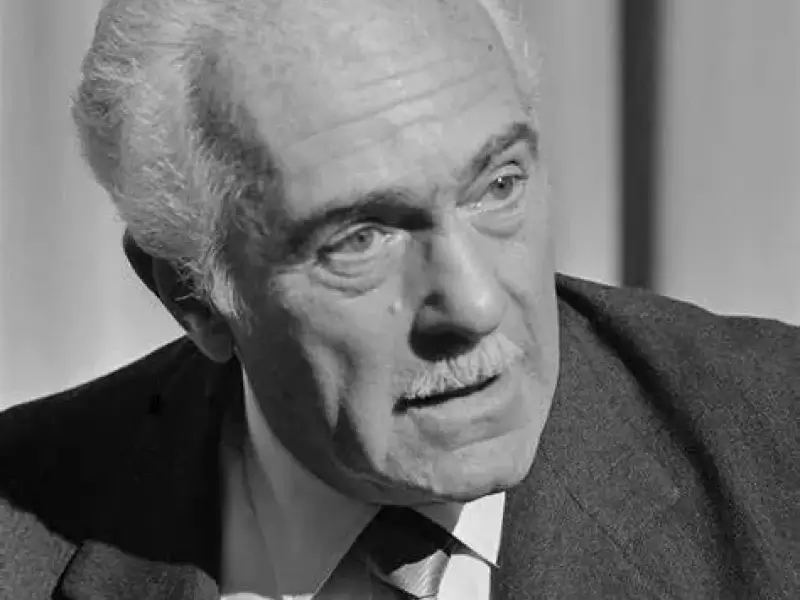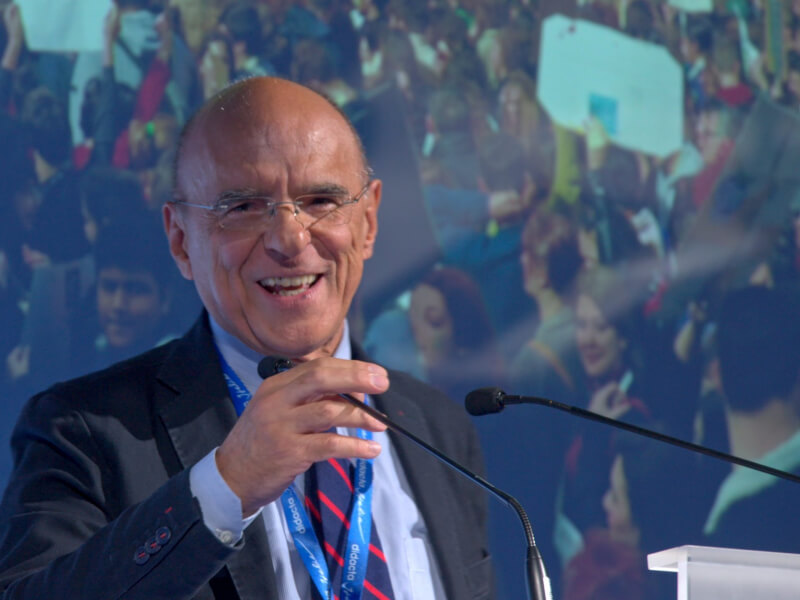07 February 2024 – Aurelio Peccei (1908-1984) was both an industrialist and an intellectual who had a profound influence on Western thought, which is mostly unrecognized today. Among other things, he founded the Club of Rome, the organisation which, in 1972, produced the “The Limits to Growth” report. Nowadays, the Limits to Growth is widely seen as an example of catastrophism and doom-mongering. But what did Peccei really have in mind? His speeches and books are a fascinating insight into the way of thinking of the 1950s-1970s. Peccei was neither a catastrophist nor a doom-monger. He was concerned, more than all, with the diffusion of prosperity, intended as freedom from fear and want, as a way to promote peace and cooperation in the world.
Aurelio Peccei is a misunderstood and largely unknown figure. Yet, his influence on the world has been profound, in particular for the report that he sponsored after founding the Club of Rome, “The Limits to Growth” of 1972. Today, the figure of Peccei and the report are often seen as the same thing, mostly an expression of catastrophism and doom-mongering that history demonstrated to be wrong.
But that’s not the case. As always, reality is much more complex and nuanced than the simplified versions we read in the media. Peccei was far from being a catastrophist, although he was concerned about the possibility of catastrophes to befall humankind. He was the sponsor of the “Limits to Growth” report, but he interpreted in a way that went way beyond that of the conventional catastrophism “we are all going to die” that dominates certain sectors of the debate today.
Who was Peccei, really? Of course, he was a man of his time. His ideas were influenced by the atmosphere of optimism that pervaded the decades from the 1950s to the early 1970s. It was the time when the discovery of atomic energy and other technological marvels promised a bright future with flying cars and weekends on the moon for everyone.
At the same time, though, Peccei was influenced by the dark streak of pessimism that pervaded those years. The threat of Nuclear War was ever present, linked to the competition between the Western and the Communist blocks, and it looked like a major danger for humankind. Then, in the 1960s, the world’s population was still under four billion people, but famines were a fact of the day and the future looked gloomy. The gap between the rich countries and those called the “underdeveloped” nations was an obvious injustice, as well as a source of tension and unrest.
Nevertheless, during these years, there was a brief moment of optimism when people thought that collaboration and international institutions could change the world into a better one. Aurelio Peccei was part of this movement of ideas, one of the prominent thinkers of the time who advocated cooperation and collaboration to build a better world. As an example of what he wrote, here is an excerpt from a 1965 speech
… the technological revolution must be guided in the attack on the real problems of the next decade: survival in the nuclear age, that is “pacem in terris”, overpopulation, hunger in large parts of the world, education in the broadest sense, justice in liberty, better circulation and distribution of wealth produced inclusive of the technological patrimony itself, that is well-being. This substitution is at the same time the prerequisite and consequence of a longer term global political approach, necessary for leading intelligently human activities during the seventies. The responsibility for defining it obviously falls on the most developed nations. It is a responsibility of world leadership which calls for establishing in the stride of history an overall strategy for the defence and promotion of fundamental common interests.
In adopting this guiding philosophy I believe that the principal objective of a global policy by civilized nations must be that of enlarging and consolidating the area of prosperity, which exists today in the world. I employ the word prosperity not because wealth is the greater blessing, even if it is difficult that immaterial values prosper under poverty, but because we are accustomed to measuring it. By increase in prosperity must therefore be understood not only the increase in individual income but also the raising of the level of life in all its aspects, a complex operation requiring human sympathy, great educational efforts and technical intervention, no less than financial resources. To accomplish such a vast design, as is that of extending decade prosperity to other regions of the world, the leadership of the United States is paramount, but the full participation of Europe is indispensable. Therefore the attainment of an advanced degree of European unity constitutes an absolute prerequisite.
You won’t find in these paragraphs, nor in the whole document, anything about “limits,” “collapse,” or the like. Peccei was not a catastrophist; he was concerned with the fundamental issue of peace, level of life, and, more than all, prosperity. Note also that he didn’t want to impose anything on anyone. He believed that if people were free from want and fear, they would make good choices for themselves and everyone else.
These ideas were popular in the 1960s, but Peccei went one step ahead by setting up an organisation called the “Club of Rome” and then sponsoring a study called “The Limits to Growth,” still well known (although poorly understood) today.
Peccei sponsored the “Limits” study as part of his proposal for global prosperity. If the pie has to be fairly shared with everyone, then one must know how large it is. Indeed, the main part of the study was a detailed evaluation of the world’s resources. That evaluation formed the database for the model that went on to examine how these resources would be used in a projection of the growth of the world’s industrial and agricultural systems.
The results were unexpected for Peccei and everybody else. The model showed that, if the current trends were maintained, the world’s industrial and agricultural systems would keep growing up to the first decades of the 21st century and then collapse under the combined effect of pollution, overexploitation, and overpopulation.

Figure: the “base case” scenario of the 1972 study “The Limits to Growth”. The world has approximately followed these curves up to now.
Surprising as they were, these results were not in contrast with Peccei’s optimism. On the contrary, they showed that it was urgent to reach an agreement among the people of the world in order to avoid the collapse shown by the model if the current trends were maintained.
Unfortunately, the results of the study were widely misunderstood. One problem was that the scenarios were for an average that didn’t distinguish between the rich and the poor. And when the scenarios were tweaked to show solutions that didn’t generate collapse, the result was a flattening of the production curve. Later on, that gave rise to the idea that “zero growth” was needed to avoid collapse.
Peccei was not fooled by this misinterpretation. He perfectly understood that “zero growth” meant that the poor would remain poor. Therefore, it was essential to allow poor countries to grow their economies to the same level as rich ones. In 1973 Peccei stated:
An erroneous image of the Club has, therefore, formed as a group advocating zero growth. Again, the possible consequences of unregulated growth of the industrialized societies and, still more, those which would arise if growth were abruptly brought to a halt, has disturbed some of the less developed countries where, we have already said, the report is all too easily seen as a selfish proposal from the developed world which would still further aggravate the difficulties of the great mass of underprivileged on our planet.
But in our world there still holds something attributed to Cardinal Richelieu: “Give me six lines written by the hand of the most honest of men, and I will find something in them which will hang him.” Peccei’s positions were rapidly becoming politically incorrect. A backlash from the powers that be arrived when Peccei stated again his views that further growth was necessary in a meeting in Philadelphia in 1976.
In 1981, Julian Simon (1932-1998), a flamboyant defender of economic growth and self-styled “doomslayer.” In his book, “The Ultimate Resource” (1981 edition, p. 286) Simon cited an article in “Time” magazine about the 1976 Philadelphia meeting:
The most compelling criticism of the Limits to Growth simulation, however, was made by the sponsoring Club of Rome itself. Just four years after the foofaraw created by the book’s publication and huge circulation — an incredible 4 million copies were sold — the Club of Rome “reversed its position” and “came out for more growth” [..] The explanation of this reversal, as reported in “Time” is a masterpiece of face saving double talk.
Remarkably, Peccei was accused of having reversed a position that he never took. Nothing special; it is the way propaganda works. It exploits the way complex ideas make their way into people’s minds — they are always simplified and often twisted in ways that turn them into the opposite of what they were supposed to be.
Unfortunately, this attack by Simon was successful, and it was one of the many that buried Peccei and the Club of Rome in an avalanche of lies and false accusations. Today, if you look for “Peccei” on the Web, you’ll often find him associated with all sorts of crimes, even including accompanying his quote with a picture of Adolf Hitler. And note that Peccei fought in Italy as a partisan during WW2, was captured and tortured, and barely survived. Associating him with Hitler is total madness, besides being an insult to a man who risked his life for his ideas. But, again, it is the way propaganda works. It can turn anything into its head and propose to you the opposite of the truth as the truth, even that Peccei was Hitler’s supporter.
But, apart from slander and propaganda, what can we say about Peccei’s ideas? His vision is not obsolete: for instance, ‘freedom from fear’ and ‘freedom from want’ are regarded as the two pillars of the United Nations Millennium Declaration’s Goals. Yet, of course, the world has been moving in a different direction in comparison to what Peccei and others had in mind. At the time, many people sincerely believed that the “leadership of the United States” would have been the driving force leading the world to peace and shared prosperity. The US and Europe have squandered their prestige in a series of unending wars, and it is becoming more and more unthinkable that they could be considered leaders in anything. But other nations and other communities may take the lead to show the path to the others.
Today, we are on a edge, a sort of bifurcation in the road that may take humankind to disaster if we take the wrong path. But that is not unavoidable. Collapse is something we inflict on ourselves when we refuse to examine the effects of our actions. By taking the right actions of collaboration instead of wars and bombing, we can still move on the path toward the world that Peccei imagined.
First published on The Seneca Effect






